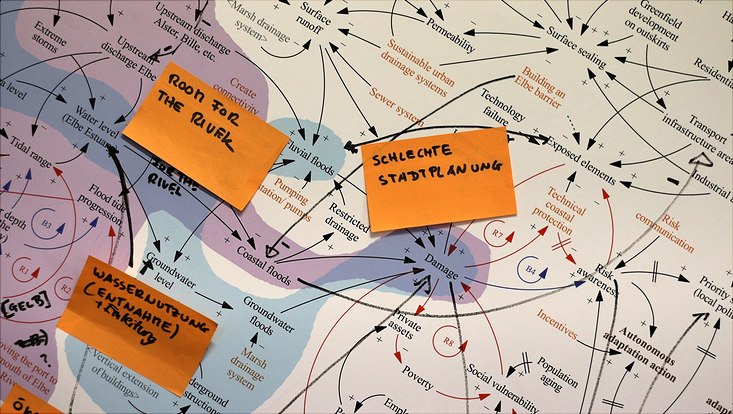and Society (CLICCS)
Stakeholder ExchangeWater Risks in Hamburg
2 December 2024, by CLICCS News

Photo: Uni Hamburg/CLICCS/T.Wasilewski
The CLICCS project “Water from four sides” invited practitioners and representatives of the scientific community to a joint workshop. The topic: water-related risks and sustainable climate change adaptation in Hamburg – and how the required changes could be initiated in the city.
“Adapting to climate change for a sustainable Hamburg – which measures could transform the city?” that was the title of the workshop led by Dr. Franziska S. Hanf from the University of Hamburg’s Cluster of Excellence for climate research CLICCS. In the course of an afternoon, the more than 30 participants – including representatives of seven Hamburg authorities, the public enterprise in charge of water supply and wastewater disposal HAMBURG WASSER, the Hamburg Port Authority (HPA), the State Agency for Roads, Bridges and Waters (LSBG), and the scientific community – worked together in a range of groups.
“Water from four sides” – Hamburg is threatened by flooding in four different ways: rising groundwater, storm surges, flooding rivers, and extreme precipitation. When combined with socioeconomic, political and/or institutional factors, this can produce water-related risks. In an attempt to visualize the entirety of interfaces and interdependencies in Hamburg’s “urban system” with regard to water risks and adaptation to climate change, climate physicist Hanf presented a comprehensive graphic model depicting a network of these interrelations. The model was developed as part of the interdisciplinary research project CLICCS C1.
During the workshop, the participants expanded the model with their own knowledge. Which interactions lead to water risks in the City of Hamburg? Are the measures currently in place helping to reduce those risks? How does a given measure influence other components and actors in the system? The participants engaged in lively discussions on these complex structures and interdependencies.
For example, in the event of a flood, a representative of the City Archive would have to take measures to protect their documents and the HPA would have to deal with sediment washed up in the port, while the civil hydraulics engineer would have to focus on the city’s dikes. “Achieving a sustainable adaptation to climate change takes a holistic, systematic perspective,” says the climate expert. “Only then the measures taken can be successful in the long-term – and without creating new problems elsewhere.”
In order to initiate the required transformations in the city, “chains of leverage” were also addressed. Here, the focus was on recognizing interrelations between various leverage points in the system. More concretely, the participants discussed “places” within the complex urban system of Hamburg at which implemented measures would promote sustainable transformation. Here, easily implementable measures could potentially trigger fundamental changes through interdependencies, thereby achieving substantial progress.
For Franziska S. Hanf, the water risks discussed represent a case study that can also be applied to other issues. By coordinating the workshop, her goal is to promote “systemic thinking”. “There is no question that adaptation measures to climate change are necessary in Hamburg,” she says. “Our goal is to use them as a motor for the transition to a sustainable city. Ideally, synergies and co-benefits with climate mitigation should be pursued in this process.”
The participants praised the opportunity for open collaboration as equals, informative conversations, and a productive working atmosphere, not to mention good networking between the professional and scientific communities. The event was also a win for the researchers in the CLICCS project, who gained valuable insights from local knowledge and practice.
Further Information
Climate physicist Dr. Franziska S. Hanf is a Postdoctoral Researcher in the Cluster of Excellence “Climate, Climatic Change, and Society” (CLICCS) at the University of Hamburg. She conducts research on sustainable urban adaptation to climate change and sustainability transformations using interdisciplinary and transdisciplinary methods.
Further information on the Water from four sides project


